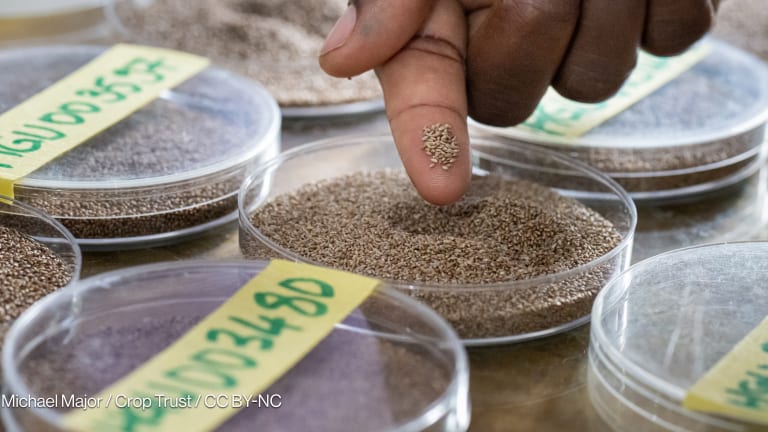IFAD launches $500M fund to channel climate finance to smallholders

The International Fund for Agricultural Development is launching a new climate adaptation fund that the organization expects to be the largest of its kind specifically targeting smallholder farmers.
The Adaptation for Smallholder Agriculture Program, known as ASAP+, aims to mobilize $500 million to reach more than 10 million people with climate adaptation activities. It is an enhanced version of a program that began in 2012 and is being formally launched by IFAD President Gilbert Houngbo on Monday at the Climate Adaptation Summit.
Part of our Focus on: People and the Planet
This series explores how climate change and other planetary imbalances impact the rising trend of human inequality. We look into the potential solutions to eliminate inequality and support a healthy planet.
Meike van Ginneken, associate vice president of the strategy and knowledge department at IFAD, said the fund is needed because climate adaptation is a large challenge in countries where IFAD works but remains dramatically underfunded by international financial institutions and other donors. An IFAD report published in November found that only 1.7% of climate finance currently goes to smallholders in low-income countries, with most funding instead being directed toward climate mitigation and reducing carbon emissions.
The $30 billion globally spent on climate adaptation needs to increase tenfold if it is to have the needed impact, van Ginneken said.
“If you look at climate finance, most of it goes to mitigation, renewable energy, etc. Only a small part goes to adaptation … and only a tiny fraction actually goes to smallholder farmers,” van Ginneken said.
“We really wanted to give this a boost because we actually see that other actors are not really reaching the poorest, and we can really help in making sure that the climate finance that is available is reaching the people who need it most.”
“We really need to make sure that those who feed us don’t go hungry themselves.”
— Meike van Ginneken, associate vice president, IFAD strategy and knowledge departmentASAP+ will focus on helping smallholder farmers with adaptive farm practices such as making crops more drought resistant, encouraging crop diversity, and improving water management. It will also focus on teaching smallholders how to farm to anticipate climate changes on their land by adapting which seeds they buy, when they plant, and how they till.
There is also a need to ensure the digital revolution benefits farmers by giving them greater access to weather information and market prices.
“Smallholder farmers are smart entrepreneurs, so if you give them the resources and the knowledge to adapt to the climate, they will do so,” van Ginneken said.
Van Ginneken said climate adaptation is particularly needed in sub-Saharan Africa, and recent IFAD research shows that climate change could cause staple crop harvests to decrease by as much as 50% to 90% across Angola, Lesotho, Malawi, Mozambique, Rwanda, Uganda, Zambia, and Zimbabwe. With no action, an additional 140 million people may need to migrate by 2050.
Although smallholder farmers have done little to contribute to climate change, van Ginneken said they are often the most impacted by higher temperatures and disrupted rainfall patterns.
IFAD intends to use ASAP+ to complement its ongoing projects with more innovation and to scale up work with governments, farmer organizations, Indigenous groups, and civil society. The program will largely focus on countries with an existing IFAD portfolio, but in some cases it will fund projects that could benefit from a climate adaptation approach but where there are no existing IFAD allocations. It will also selectively finance stand-alone projects.
Van Ginneken said preliminary estimates show that financing for climate adaptation decreased by 10% in 2020 because governments faced budgetary pressures from the COVID-19 pandemic. This makes the ASAP+ fund even more timely, she said.
“It’s a double whammy, no? Because on the one hand, all these problems are becoming more on the forefront. The vulnerability of smallholder farmers and the resilience to shocks — whether it’s a pandemic, whether it’s weather shocks, whether it’s economic and financial shocks — has become very apparent,” van Ginneken said. “But on the other hand, the competition for public funds — whether they’re government funds in countries we work in or for international donor funds — only has become more fierce.”
ASAP+ will initially have a three-year window from 2022-24 and will then be evaluated to see if extension is warranted. So far, Austria, Germany, Ireland, and Qatar have pledged to contribute. IFAD is also in the midst of raising funds in parallel for its regular replenishment cycle.
IFAD will be participating in the United Nations Food Systems Summit, to be held on the sidelines of the U.N. General Assembly in September, and is considering what role land management and agriculture play in securing the food system. Van Ginneken said climate adaptation is key to ensuring farmers are able to feed a growing population with nutritious food.
“We really need to make sure that those who feed us don’t go hungry themselves. That means that we need to look into climate adaptation and resilience. It also means that we need to think about what the next generation of rural population, rural men and women — how they’re going to make their livelihoods,” van Ginneken said. “There’s an interrelationship, but it’s also really important to put livelihoods of the rural poor at the center of the Food Systems Summit.”
This focus area, supported by the U.N. Development Programme, explores how climate change and other planetary imbalances impact the rising trend of human inequality and vice versa. Visit the Focus on: People and the Planet page for more.

Search for articles
Most Read
- 1
- 2
- 3
- 4
- 5








